Waste Not: Citrus Vinegars Recipe

American cooking icon, James Beard once said, “it is true thrift to use the best ingredients available and to waste nothing.” When thinking about full-use cooking, many see it as aspirational. Ingredients like fruit peel, vegetable stems, and scrap kimchee aren’t classically acknowledged as elevated ingredients. But chefs like Beard would beg to differ. Dubbed the “Dean of American Cuisine” by Julia Child, Beard had an unpretentious approach to food and aimed to introduce others to sustainable cooking.

Inspired by the resourceful spirit of Oregon-native James Beard, Waste Not provides tips and recipes to turn every bone, stem, root, and peel into something delicious. From broccoli stem vinaigrette to leftover doughnut crème brûlée, this revolutionary recipe book teaches that full-use cooking can be fun and attainable.


According to the James Beard Foundation, if Americans were to reduce food waste just one day a week, it would equate to nearly 8 million tons of food being saved every year. Enter the Waste Not Initiative, a movement started to inspire others to approach food responsibly and economically. By adopting sustainable practices one day a week, on "Waste Not Wednesday," they hope to think differently about food and encourage others to do the same. So, to kick things off, we thought we'd share a simple and straightforward citrus-infused vinegar recipe from its pages.


Citrus Vinegars
“After zesting and juicing citrus, the white domes you're left with don't seem very useful. But those pithy domes still have more flavor to give! At Nick's on Broadway, chef Derek Wagner calls these the 'hearts' of the fruit, and uses them to make batches of citrus-infused vinegars that are used in everything from the bar to savory dishes to the pastry kitchen. You will need just enough vinegar to cover the spent citrus, so how much vinegar you make will depend on how much fruit you're using.”
Ingredients:
Yields 1 Quart Vinegar
-
4 to 8 lemon hearts (white part that's left after the fruit has been zested and juiced for other purposes)*
-
Distilled white vinegar (enough to cover)
-
Sugar (3/4 cup per quart of vinegar)
-
Kosher salt, to taste
-
Sealable glass jars
Directions:
-
Submerge the citrus hearts in plain white vinegar and store them in the refrigerator for at least two weeks (they can soak for longer, but need a minimum of 2 weeks to extract enough flavor).
-
After two weeks, strain the vinegar into a pot. Add sugar and slowly bring it to a very gentle simmer for three minutes.
-
Taste the vinegar and add salt for seasoning if needed. Allow to cool and pour into jars and refrigerate.
*You can also use lime, orange, tangerine, grapefruit, or other citrus fruits for this recipe.



How to Use Your Citrus Vinegars:
-
In dressings and marinades, like a lemon-rosemary vinaigrette or a tangerine-thyme-honey vinaigrette. Finish dishes like roasted fish or chicken, or simple broccoli or asparagus.
-
Add a touch of vinegar to simple syrup, toss with sliced fruit, and serve as dessert.
-
Use as you would shrubs to add brightness and acidity to mixed drinks. (You can add a touch more sugar or infuse the vinegar with herbs, if desired).
Recipe by Derek Wagner. From Waste Not: How To Get The Most From Your Food.




